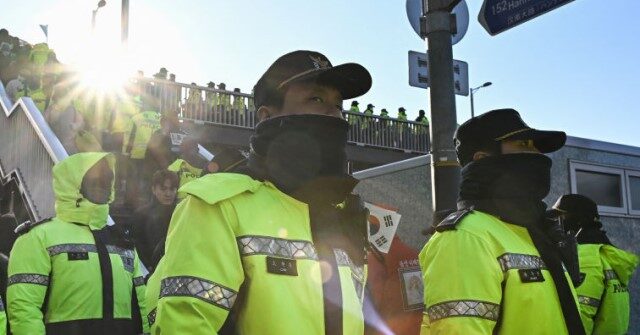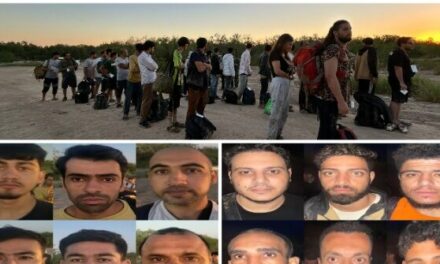We support our Publishers and Content Creators. You can view this story on their website by CLICKING HERE.

South Korean President Yoon Suk-yeol avoided arrest on Friday when his security detail refused to allow investigators into his residence, where he has been sequestered since December 12.
Friday’s hours-long standoff between agents of the Corruption Investigation Office for High-Ranking Officials (CIO) and the Presidential Security Service (PSS) answered a question in the minds of many observers of South Korea’s political apocalypse: would the PSS invoke its authority to refuse the police access to locations deemed vital to national security? Could Yoon avoid being arrested by hunkering down in such a location?
The answer turned out to be: yes they would, and yes he could. CIO investigators camped outside Yoon’s residence in Seoul for almost six hours, backed up by thousands of police officers, before abandoning their effort to serve arrest and search warrants issued by the Seoul Western District Court on Tuesday.
Yoon’s lawyers have insisted all along that those warrants could not be executed at his official residence without his consent because the president’s home is “linked to military secrets.”
PSS chief Park Jong-joon, a longtime official in the agency who was appointed as director in September 2024, turned up at Yoon’s residence with 200 of his agents in tow, supported by military forces detailed to the PSS and physically blocked CIO investigators from getting past the inner gates.
Members of the opposition Democratic Party (DP) urged Park to stop protecting Yoon and asked acting president Choi Sang-mok to intervene. Both appeals were unsuccessful.
Some minor altercations were reported as investigators tried to push past the human fence of soldiers and PSS agents, but no one drew their weapons. The CIO said it eventually backed down because it was worried about the safety of its agents.
“We’ve determined that the arrest is practically impossible,” the investigative agency said.
The CIO issued a statement expressing “serious regret about the attitude of the suspect, who did not respond to a process by law.” It also named Park Jong-joon and his deputy in a criminal complaint about obstruction of justice by the PSS.
The police surrounded the presidential residence during the standoff as hundreds of pro-Yoon demonstrators gathered outside, some waving “Stop the Steal” banners harkening back to the 2020 election controversy in the United States, and asking President-elect Donald Trump to come to Yoon’s rescue.
South Korean social media is filled with pro-Yoon posts using #StoptheSteal as a hashtag, and also adopting Trump’s “Make America Great Again” slogan.
“I hope that Trump will take office soon and raise his voice against the rigged elections in our country plus around the world so as to help President Yoon to return swiftly,” a demonstrator outside Yoon’s house said on Friday.
Yoon was impeached for attempting to declare martial law on December 3, an effort that failed when enough legislators gathered in the cordoned-off National Assembly chamber to vote in favor of overturning the president’s decree.
Yoon said martial law was necessary because “subversive, anti-state elements” in the opposition were blocking his agenda and paralyzing his administration.
“I declare martial law to protect the Republic of Korea from the threats of North Korean communist forces, to immediately eradicate the unscrupulous pro-Pyongyang anti-state forces that pillage the freedom and happiness of our people and to protect free constitutional order,” Yoon said at his emergency press conference on December 3.
After imposing martial law, Yoon sent hundreds of soldiers to raid South Korea’s National Election Commission (NEC). He later claimed North Korea hacked the NEC to interfere with the last parliamentary election in April 2024, in which the DP won a large majority of National Assembly seats.
When the NEC denied these allegations and the National Intelligence Service (NIS) refused to confirm it had detected any North Korean hacking activity, Yoon accused them of refusing to cooperate with a vital inspection of election integrity.
Yoon’s supporters have since taken up the charge that the April 2024 election was tainted and the DP’s legislative majority could be illegitimate. They also contend his impeachment was illegal and will be overturned.
“What happened to Trump is happening to Yoon Suk-yeol,” said one pro-Yoon demonstrator, emotionally describing the president as “fighting alone” against a corrupt system and rigged election.
Hundreds of anti-Yoon demonstrators were also present outside his residence on Friday, expressing anger and frustration that the effort to serve court warrants against him was thwarted.
“Detain and arrest Yoon Suk Yeol immediately! Let’s wipe out the accomplices, sympathizers, and party of insurrection!” read signs waved by the anti-Yoon protesters.
Foreign journalists covering the demonstrations marveled that both protesters and counter-protesters were willing to brave freezing temperatures. Many on both sides said they planned to stay on the streets overnight, even though the temperature in Seoul is expected to drop below 20 degrees, because another attempt to arrest Yoon could be made at any time.
Yoon wrote a letter to his supporters on Thursday in which he vowed to “fight until the end to protect this country together with you.” His critics accused him of attempting to incite his supporters to violence with his defiant comments.
The current arrest warrant for Yoon expires on January 6 and opposition leaders are urging the CIO to try again before it runs out. Meanwhile, Yoon’s supporters are questioning the authority of the CIO to make an arrest, as it is a fairly young agency with uncertain powers and jurisdiction.

 Conservative
Conservative  Search
Search Trending
Trending Current News
Current News 





